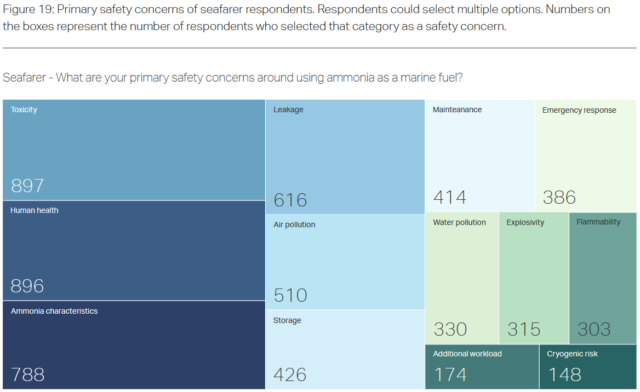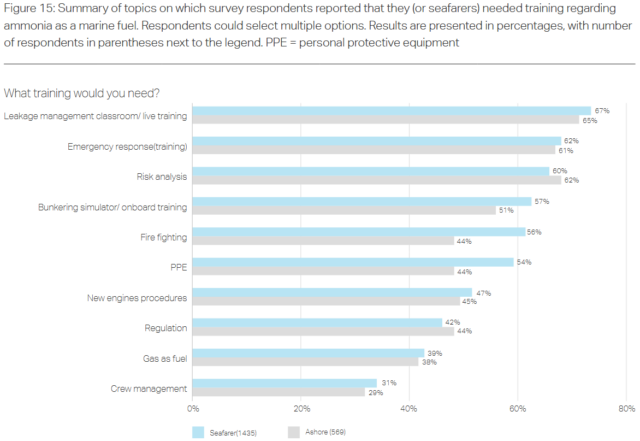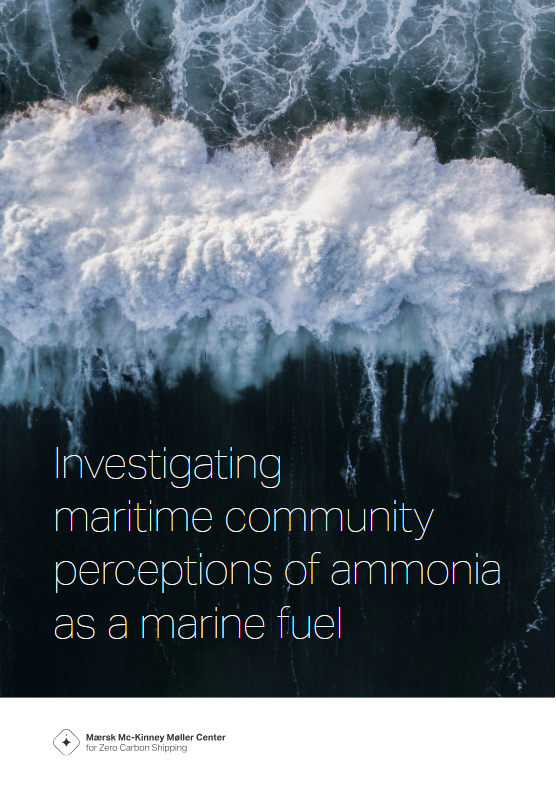Seafarer survey: majority willing to sail on ammonia, comprehensive training a must
By Julian Atchison on October 29, 2024
The Mærsk Mc-Kinney Møller Center for Zero Carbon Shipping (MMMCZCS) has released results from a new survey of over 2,000 workers across the maritime community. The cohort covers a range of different ages, roles, vessel types, and differing levels of experience with gaseous fuels or with ammonia as cargo. 59% of seafarers and 57% of onshore workers who responded to the survey agreed that they would be willing to work with ammonia (26% of seafarers and 19% of onshore workers were unsure). Many respondents indicated that their willingness is contingent on comprehensive training and certification, and there was a notable lack of understanding about technical aspects of ammonia fuel handling.
MMMCZCS has been working on marine ammonia safety since 2021. In 2023, a joint publication with Lloyd’s Register outlined a quantitative risk assessment analysis for vessels sailing on ammonia fuel, and highlighted the important role of human factors making the transition to ammonia fuel. As part of that work in 2023, the need to capture the marine industry’s perception of ammonia fuel was identified, leading to this survey.
In publishing this survey report, we aim to share the opinions, concerns, and suggested ways forward raised by the community who will be most directly impacted by the use of ammonia as a marine fuel. The knowledge shared in this report can help the industry to address the concerns and misperceptions raised by first-in-line operators. In addition, the survey findings can be used to shape future training content and address upcoming ship and fuel systems designs, as well as guidelines for safe bunkering and in-port handling of ammonia.
Mærsk Mc-Kinney Møller Center for Zero Carbon Shipping, Investigating maritime community perceptions of ammonia as a marine fuel, 22 Oct 2024
Comprehensive training, operational experience, and knowledge sharing: all must-dos
MMMCZCS emphasises that the general willingness to sail on ammonia fuel is conditional. Primary safety concerns about the use of ammonia fuel – toxicity, effects on human health, effects on environment and accidental leaks/emissions – are accompanied by a desire to know more on these and related topics, and for comprehensive training to address any and all concerns.

Click to expand. Primary safety concerns of seafarer respondents for the use of ammonia fuel. Fig 19 from Investigating maritime community perceptions of ammonia as a marine fuel (MMMCZCS, 2024).
The report notes that – while the general characteristics of ammonia were understood – there was little understanding of the technical aspects of handling ammonia fuel safely. Training areas like leak management, emergency response, firefighting and PPE requirements were all highlighted as priorities. There was also an emphasis on live training and operational experience: classroom training will not be sufficient to overcome an unwillingness to work with marine ammonia fuel. Safety standards surrounding vessel design and new fuel systems are also a must, and will need to be strictly adhered to.

Click to expand. Summary of topics on which survey respondents reported that they (or seafarers) needed training regarding ammonia as a marine fuel. Fig 15 from Investigating maritime community perceptions of ammonia as a marine fuel (MMMCZCS, 2024).
MMMCZCS identifies this as an opportunity for improved communication and proactive knowledge sharing. As many of respondents themselves suggest, the operational experience gained from the initial ammonia-fueled vessels will be invaluable, and provide seafarers with increased confidence. Organisations willing to put more time and resources into preparing their workforces for marine ammonia fuel will find the transition easier. MMMCZCS will now embark on a series of related projects, including updates to the International Code of Safety for Ships Using Gases or Other Low-flashpoint Fuels (IGF Code), and the International Convention on Standards of Training, Certification and Watchkeeping for Seafarers (STCW Code).
